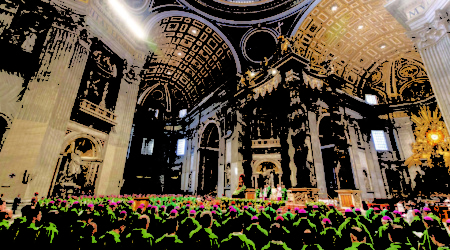Special Report: Querida Amazonia
Pope Francis timed the February 2 release of his post-synodal apostolic exhortation, Querida Amazonia, in advance of St. Valentine’s feast day very well because it is truly a love letter. Its opening, “The beloved Amazon region,” sets the tone for what will be both a proclamation of the pope’s love for the region and its people, and an invitation to the Church and world to share in this communion of love. The pope’s reflection takes the form of four dreams for the benefit and good of this beloved place.
A social dream
Love for the people of the Amazon basin is at the heart of this first dream. In this section, Pope Francis reiterates the theme from his encyclical Laudato Si that ecological crisis cannot be divorced from social crisis. He will not separate the plight of the earth from the plight of the poor and marginalized. He decries the exploitation and injustice suffered by the poor and indigenous. He asks forgiveness for the sins of the Church and the crimes committed during the conquest of the Americas.
He exhorts the Church to hear the plea of the people and to exercise her prophetic mission. He calls for community and social dialogue with the people of the Amazon region. He wants to restore the voice of the poor, the marginalized and the excluded, and to give them a leading role in determining the future of the region.
A cultural dream
As true love dictates, the pope does not seek to promote the region by “colonizing it culturally.” Instead, he wants the world to help the region bring out the best of itself. He calls for caring for the cultural roots of the region and intercultural encounters. The Church and the economically powerful can build up the region only through the self-constraint so that the people have the space to grow and blossom culturally on their own terms.
An ecological dream
This dream begins with a description of the first ecology we need: to care for our brothers and sisters and the environment following the example of the Lord who first cared for us. Again, the pope emphasizes any ecology of nature exists only alongside a human ecology. Thus, an ecology of nature demands a social ecology, as everything is connected.
In the spirit of a love that seeks only to contemplate, rather than to analyze and possess, Pope Francis urges the Church and the world to listen to beauty — beauty expressed through the poets, contemplatives and prophets who “help free us from the technocratic and consumerist paradigm that destroys nature and robs us of a truly dignified existence.” (46) In short, he calls for everyone to enter into a communion of love, rather than simple use; a communion of intimate belonging, rather than of simple defense.
An ecclesial dream
A final dream for the region is for the Church to grow in the Amazon region. This growth is not to be through violent or forceful imposition, but through the gentle, patient proposition of the Gospel of Jesus Christ. The pope dreams for the Church to journey alongside the people of the Amazon region, listening and esteeming the cultures she wishes to evangelize. He dreams of an inculturated Church — inculturated spirituality, inculturated social doctrine, inculturated sacraments and inculturated ministry. In summary, his dream is for a Church that truly witnesses to the “Joy of the Gospel,” and an Amazon region that is able to truly experience this “Joy of the Gospel” in terms of its own cultural expressions.
SIDEBAR: THE REACTION OF THE U.S. BISHOPS
The president of the U.S. Conference of Catholic Bishops, Archbishop José Gomez of Los Angeles, expressed, in part, the following thoughts about Pope Francis’ apostolic exhortation:
“Today, our Holy Father Pope Francis offers us a hopeful and challenging vision of the future of the Amazon region, one of the earth’s most sensitive and crucial ecosystems, and home to a rich diversity of cultures and peoples. The pope reminds us that the Church serves humanity by proclaiming Jesus Christ and his Gospel of love, and he calls for an evangelization that respects the identities and histories of the Amazonian peoples and that is open to the ‘novelty of the Spirit, who is always able to create something new with the inexhaustible riches of Jesus Christ.’”
Source: http://www.usccb.org/news/2020/20-30.cfm
SIDEBAR: AN IMPORTANT DISTINCTION
The special secretary of the Amazon synod and two other Vatican officials have explained that the difference between Pope Francis’ apostolic exhortation and the Amazon synod’s final document concerns each document’s authority. Simply put, Pope Francis’ exhortation belongs to the Church’s ordinary magisterium, or teaching authority, and the synod’s final document does not. Matteo Bruni, director of the Holy See Press Office, put it like this: “Anything in the final document should be read in the lens of the apostolic exhortation,” including any “application.”
Source: Hannah Brockhaus. “Vatican officials: ‘Querida Amazonia’ is magisterium, Amazon synod’s final doc is not.” Feb. 12, 2020. https://catholicherald.co.uk/news/2020/02/12/vatican-officials-querida-amazonia-is-magisterium-amazon-synods-final-doc-is-not/
SIDEBAR: POPE FRANCIS IN HIS OWN WORDS
On the indigenous peoples of the Amazon basin:
“They were considered more an obstacle needing to be eliminated than as human beings with the same dignity as others and possessed of their own acquired rights.” (12)
On social dialogue with the poor and indigenous of the Amazon basin:
“And the great question is: ‘What is their idea of “good living” for themselves and for those who will come after them?’” (26)
On promoting Amazon region:
“That is in fact what education is meant to do: to cultivate without uprooting, to foster growth without weakening identity, to be supportive without being invasive.” (28)
On interconnectedness:
“… the care of people and the care of ecosystems are inseparable …” (42)
On the inculturation of the sacraments:
“The Eucharist ‘joins heaven and earth; it embraces and penetrates all creation.’ For this reason, it can be a ‘motivation for our concerns for the environment, directing us to be stewards of all creation.’” (82)
On the gift of women:
“For centuries, women have kept the Church alive in those places through their remarkable devotion and deep faith.” (99)
On what unites Christians:
“And what unites us is what lets us remain in this world without being swallowed up by its immanence, its spiritual emptiness, its complacent selfishness, its consumerist and self-destructive individualism.” (108)
Source: Post-synodal apostolic exhortation Querida Amazonia, Pope Francis
SIDEBAR: DID YOU KNOW …
The Amazon basin is the largest tropical rainforest in the world, covering a size approximately equal to the lower 48 United States. Between 6 million and 8 million square kilometers of forest house approximately 10 percent of the world’s biodiversity and 15 percent of its freshwater. These “lungs of the world” provide ecological services for the planet, but also a source of livelihood for hundreds of indigenous groups and forest dependent peoples.
Source: https://globalforestatlas.yale.edu/region/amazon
SIDEBAR: BY THE NUMBERS – DEFORESTATION IN THE AMAZON REGION

